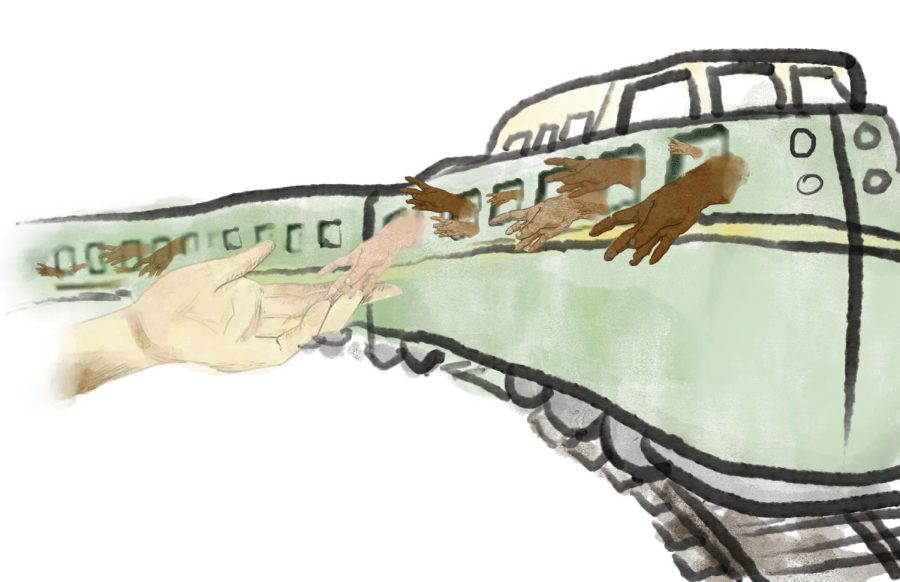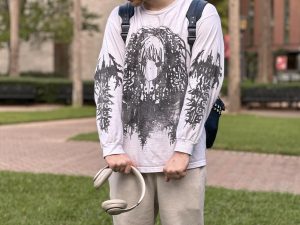EDITORIAL: Refugees all over the world are reaching out; why aren’t we reaching back?
March 17, 2022
America’s perception of Ukrainian refugees and internally displaced peoples is a product of the same racial bias as missing White girl syndrome, a tendency of the general public to focus on missing White women over missing women of color, regardless of circumstances.
And just like when White people are employed in the media and therefore more likely to report on the people who look like them in their communities, White people are also more likely to support each other politically.
White people are in a position of privilege, especially in the United States, and when they see Ukranians on T.V., they could be looking at the faces of their brothers or mothers or daughters.
It’s dangerous for White Americans to become blind to people that don’t look like them. While Ukranians are suffering and deserve our support, it’s important to acknowledge that refugees of color, including people trying to flee Ukraine, continue to suffer in silence.
Twenty-two percent of Ukraine’s population is made up of ethnic minorities. Though these people might not be ethnically Ukrainian or been born in the country, they have suffered through Putin’s war as much as anyone and deserve our support. Ukranians of color shouldn’t have to prove that they are Ukrainian when they are a part of the fight.
African students at Ukranian universities are leading their own journeys out of the country without the help of their White counterparts. Meanwhile, Germans and Poles are at airports offering up room and board for Ukranians that land in their countries. That’s not to say that other Europeans aren’t willing to help people of color but rather that communities are seeking solidarity, and there is none.
And Ukrainian refugees have received more support than any refugee movement we’ve seen. And it’s a beautiful thing. It’s objectively impressive to see people come together like this. The lights on the Las Vegas sign have been changed to yellow and blue in support of the country’s flag. The Empire State building is shining the same shades to prove solidarity. Even just a few miles from campus the Superdome has put up a display opposing the Russian invasion.
This is powerful. But where is the Syrian flag when the war is ongoing? Where was the support for Latin American asylum seekers when President Trump wanted to build a wall? Why haven’t more of us taken a stand in support of the 37 million people who were displaced by America’s War on Terror?
We are forgetting that Trump cordially sat down with Putin less than two years ago, and now the Russian president has decided to bomb innocent people. Americans are hypocrites.
When people suffer in the Global South, Americans are too often uninterested and apathetic. But when Europeans experience tragedy, Americans see themselves in their world, even when they’re farther away than people fleeing South American countries or people displaced by climate change in the U.S.
But no matter where injustices happen, they can affect us. This proves that efforts to stop immigrants like Syrian refugees from entering American borders have less to do with economic protection and more to do with xenophobia.
Feeling like you have nowhere to go is terrifying, but actually having nowhere to go is debilitating emotionally. This is the reality for so many refugees. Imagine trying to leave an awful situation in an attempt to seek refuge, but you just can’t. Imagine being turned down over and over again in an attempt to escape to safety. Imagine being a person of God trying to protect your family and being rejected for the threat you pose of potential terrorism.
Americans pay lip service to the ideals of “come as you are” and “you are welcome,” but what does the country really mean by that when Muslims coming to the U.S. are assumed to be terrorist threats even though White domestic terrorists have killed far more people than foreign-born assailants? What does that mean when our leaders want to build a wall to keep out Hispanic people who make up 16% of the country’s population?
Our culture is dependent upon the communities that we are trying to push away. We are a country of people that come from everywhere, and refugees could be our teachers or best friends or doctors or cashiers. They are us. And every last one of them matters.











Al Alcazar • Mar 27, 2022 at 4:10 am
Thanks a million, Gabby, for this beautiful, profound, and much-needed article. I am in the Philippines–10K miles away from NOLA– and still felt the power and timely wisdom of your words!!! I am so very proud of you and your work!!! God bless you!!!
dr al